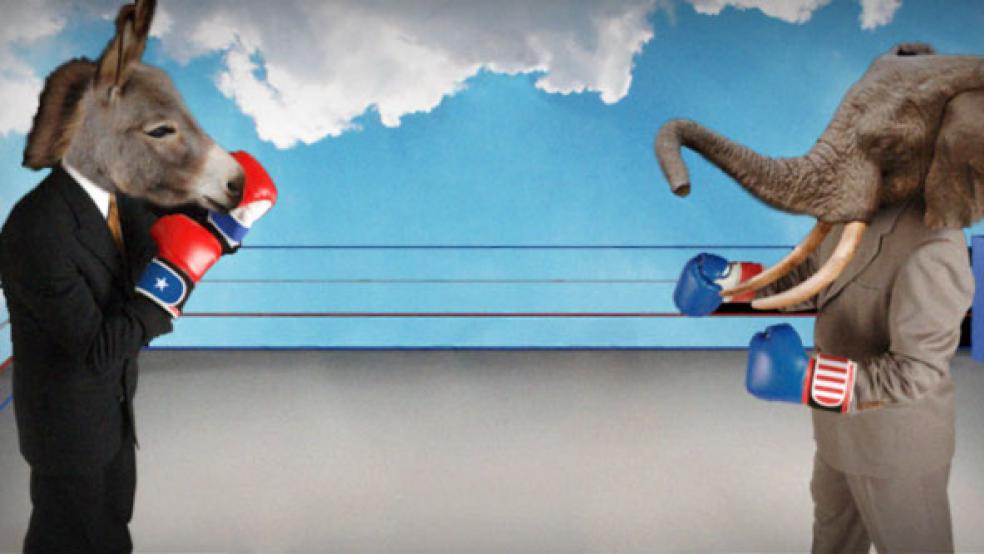Republican hopefuls are attempting to portray the coming presidential election as a battle between people who believe in free markets and those who want to turn the U.S. into a socialist state. Michele Bachmann has been quite explicit with this charge, and Mitt Romney, Newt Gingrich, and the other leading Republican candidates have made similar claims.
There are certainly those on the left who call for radical change, including the elimination of the market system, just as there are those on the right who have extreme views on a variety of topics. But the Democratic Party is not calling for the overthrow of capitalism, and the claim that Democrats prefer a socialist state is false. Democrats support markets too. The disagreement is about the best way to bring about a well-functioning market system, and whether that system produces an equitable distribution of income and opportunity.
Conservatives believe that markets work best when government involvement is minimal or absent altogether. They don’t deny that individual markets can fail for a variety of reasons, and they acknowledge that the aggregate economy is subject to cyclical swings that bring periods of high unemployment. However, with patience markets and the macroeconomy will fix themselves. If the government steps in and tries to help, on net it will make things worse, not better. Thus it’s almost always best to wait for the economy to heal itself, even if the wait is a long one.
Democrats have different ideas about what it takes for markets to fully realize their potential. They believe that individual markets work best when government takes an active role to prevent market failures. They also believe that monetary and fiscal policies are useful tools to offset cyclical swings in the aggregate economy.
Democrats also differ from Republicans on the need for government to redistribute income. Republicans believe that redistributing income reduces the incentive to pursue economic gains, and this lowers long- run economic growth. Democrats believe that a more equitable distribution of income is desirable in some instances, and that worries about the impact redistribution will have on economic growth are overstated. Democrats also believe there are significant concentrations of political power and market failures that distort the distribution of income, and these distortions should be corrected through government action.
Which of these two visions is correct? Republicans have tried to blame the financial crisis on the government, in particular government programs to support housing for low-income households, but the evidence overwhelmingly refutes this claim. The problem wasn’t too much government, it was that government did not do enough.
We would be much better off today if government had ignored Alan Greenspan and other advocates of deregulation who argued that financial markets are self-policing, and had instead provided strong regulatory oversight of both the traditional and shadow banking sectors. We would also be better off if the Fed had intervened and popped the housing bubble as it was inflating rather than denying there was a bubble and arguing it could always clean up the mess quickly and neatly in any case.
And in assessing the two views, it’s important to note that the things the government did do were helpful. Though the design of the Bush administration’s bailout of the financial sector left much to be desired, it prevented a much worse outcome. There’s also little doubt that the fiscal stimulus put in place during the Obama administration helped the economy. Things would be better today if we had resisted the austerity minded and done even more to stimulate output and job creation.
In the coming year, we will have to choose between these competing views of the government’s proper role in the economy. The Republican view is that the economy can take care of itself. There’s no need for government to intervene, and the distribution of income – no matter how skewed – should also be left alone.
We’ve already tried Republican policies in recent decades and the promised economic growth, stability, and widely shared prosperity did not materialize. Instead we had a Great Recession, inequality widened substantially, and market and political power became more and more concentrated.
In addition, the recent recession challenges the GOP’s “markets are magic” point of view. During the time when the housing bubble was inflating, markets misdirected resources and too much of our intellectual talent, labor, and raw materials were drawn into housing and finance. Markets also failed to optimally hedge against risks, they have been very slow to self-correct – labor markets in particular – and the fact that the extraordinarily high profits in the financial sector have not been eroded away through new entry is a sign of excessive and persistent market imperfections.
The other view, that of Democrats, speaks directly to these problems. It embraces active oversight of markets to ensure they are operating to maximize social good, it encourages the use of countercyclical monetary and fiscal policies to stabilize output and employment, and it advocates correcting the inevitable inequities in income and opportunity that arise in imperfect, real world market systems.
Thus, contrary to the charge from Republicans that Democrats are anti-market, there’s a strong argument to be made that it’s the policies of Democrats rather than Republicans that do the best job of allowing markets to reach their full potential.






